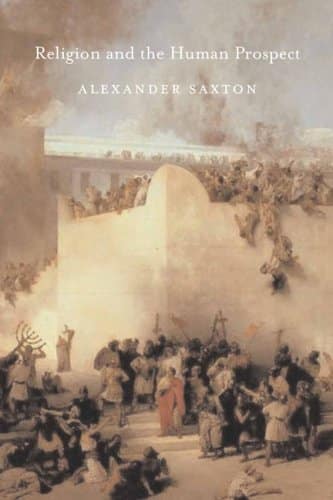Religion and the Human Prospect
$19.95
Since September 11, 2001, religion has been at the center of debates about the global future. Religion and the Human Prospect relates these issues systematically to a path-breaking interpretation of the history of religion, its part in human development, and its potential role in preventing or enabling global catastrophe.
Religion has made possible critical transitions in the emergence and development of human society. At the moment when our humanoid ancestors became aware of the inevitability of death, religion interposed the belief in spiritual beings who gave it new significance. When individual self-interest and collective survival conflicted, religion defended collective survival by codifying its requirements as morality. When inequalities of wealth and power developed, religion extended moral codes to include obligations of dominance and submission. Religion enabled a species facing constant hunger and scarcity to adapt and spread.
Today, however, facing ecological disaster, exhaustion of essential natural resources, and the proliferation of nuclear, chemical and biological weapons, religion no longer provides a collective defense mechanism for the human species. Instead, the solutions it has provided have now become central to the problem of human survival.
This magisterial and compelling work weaves together evolutionary theory, anthropology, reflection on theological treatments of the problem of evil, and ideas from literature and philosophy into an account of the human prospect that is truly epic in its ambition and explanatory power.
Religion and the Human Prospect is a work of amazing originality and profound scholarship that is an urgent tract for our time. Saxton brings us face to face with the massive worldwide religious revival of the past quarter century and the flight of major social scientists from Enlightenment values and scientific conquests. In response, he offers huge, and disconcerting, analyses of the universality of religion in human societies, of its historical role in sustaining the species, of its capacity to circumvent the most devastating intellectual criticisms, and of its current potential for accelerating environmental destruction and bringing on war. Saxton has, in previous incarnations, given us the classic proletarian novel, The Great Midland, and path-breaking studies of working-class racism. His new, rigorously argued book might be his most important contribution yet. None of us can afford to ignore it.
—Robert Brenner, director, Center for Social Theory and Comparative History, UCLA
author of The Economics of Global Turbulence
In this astonishingly learned study, the great historian and novelist Alexander Saxton illuminates the central questions of human existence and of our time. Brilliantly applying materialist methods, even when departing from specifics of Marx’s conclusions on religion, Saxton’s work ranges widely from anthropology to history, from revolution to theology, from Milton to the faith-based brutalities surrounding us. Alive to contradiction, this book is among our best and most spirited guides to what Saxton calls the ‘common-law marriage’ of science and religion and, we might add, of capitalism and fundamentalisms.
—David Roediger, Babcock Professor of History, University of Illinois, author of History Against Misery
Alexander Saxton has written yet another brave and important book. In his proletarian novels, his histories of race and class in America, and now his long-awaited study of religion and human life, he tells big and uncomfortable truths. He is a writer to be treasured.
—Marcus Rediker, professor of history, University of Pittsburgh
author of Who Built America? and Villains of All Nations
Whither the world in the new millennium, as we face the perils of nuclear annihilation and ecological death? Anxiously concerned for what the future may hold, Saxton ponders the role of religion in creating our frightening human condition. His brilliant and deftly written treatise is a jeremiad of hopeful despair.
—Ronald Takaki, author of Hiroshima: Why America Dropped the Atomic Bomb
Table of Contents
Acknowledgments
- The Human Condition
PART ONE: Religion as an Object of Study
- Homo Religiosus
- Tylor’s Definition and the Social Science Stance
PART TWO: Religion and Cultural Evolution
- The Crisis of Consciousness
- Morality, Gender, and Class
- The Evil Empire
- The Problem of Evil
PART THREE: Religion and the Will to Believe
- Promethean Readings
- Theodicy
- Empiricizing the Spiritual
- Marxism and the Failed Critique of Religion
- High Tide at Dover Beach
PART FOUR: Knowing and Believing
- The Great Lizard Analogy
- Jerusalem
Alexander Saxton is emeritus professor of history at UCLA. He is the author of three novels and several historical works, including The Rise and Fall of the White Republic: Class Politics and Mass Culture in Nineteenth-Century America.
Publication Date: August 2006
Number of Pages: 256
Paperback ISBN: 9781583671337
Related products
-
Monthly Review Volume 2, Number 9 (January 1951) [PDF]
$10.00 Add to cart -
Monthly Review Volume 2, Number 6 (October 1950) [PDF]
$10.00 Add to cart -
Monthly Review Volume 2, Number 5 (September 1950) [PDF]
$10.00 Add to cart -
Monthly Review Volume 2, Number 4 (August 1950) [PDF]
$10.00 Add to cart -
Monthly Review Volume 2, Number 3 (July 1950) [PDF]
$10.00 Add to cart -
Imperialism and World Economy
$15.00 Select options This product has multiple variants. The options may be chosen on the product page

![Monthly Review Volume 2, Number 9 (January 1951) [PDF]](https://monthlyreview.org/wp-content/uploads/2015/09/Monthly Review Volume 2, Number 9 (January 1951) [PDF].jpg)
![Monthly Review Volume 2, Number 6 (October 1950) [PDF]](https://monthlyreview.org/wp-content/uploads/2015/09/Monthly Review Volume 2, Number 6 (October 1950) [PDF].jpg)
![Monthly Review Volume 2, Number 5 (September 1950) [PDF]](https://monthlyreview.org/wp-content/uploads/2015/09/Monthly Review Volume 2, Number 5 (September 1950) [PDF].jpg)
![Monthly Review Volume 2, Number 4 (August 1950) [PDF]](https://monthlyreview.org/wp-content/uploads/2015/09/Monthly Review Volume 2, Number 4 (August 1950) [PDF].jpg)
![Monthly Review Volume 2, Number 3 (July 1950) [PDF]](https://monthlyreview.org/wp-content/uploads/2015/09/Monthly Review Volume 2, Number 3 (July 1950) [PDF].jpg)
